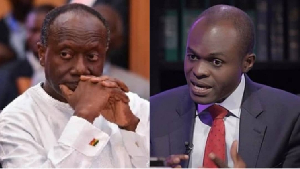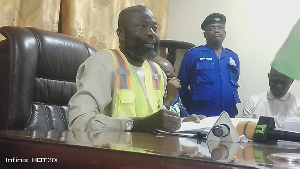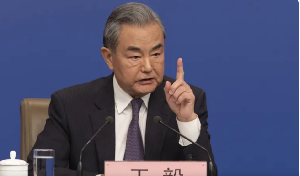The last week saw many Chief Executive Officers and Managing Directors of state-owned organizations being reshuffled or being relieved of their positions. Sylvester Mensah of the NHIA was one of them.
While it was clear and indeed expected that some will be axed, others came as a shock to many because they were obviously doing well to turn-around the fortunes of the organizations they headed. Sylvester Mensah who headed the NHIA until recently was transformational. He has been described by those who know him at close range as a visionary, an affable but stern person and one who is result-oriented.
The media interest generated by his exit from the NHIA made me want to dig a bit deeper why the traditional media space was busy reporting that Mr Mensah had been relieved of his post. Social media was flooded with this news. In fact, others reported erroneously that he resigned, but that was subsequently corrected when the full facts emerged that he had served six years as boss of the NHIA and that it was time to go.
Indeed, Mr Mensah himself said on Peace FM that his 5-year tenure was to have ended June last year but the President was gracious to him by extending it for an extra year. I thought to myself, why should one man’s exit from an organization generate such huge discussion in the news media? There should certainly be something about him!
Apart from the usual political bad-mouthing and hurt-my-opponent mentality becoming entrenched in our society because of NDC-NPP politics, a great number of people and comments indicated that the former MP, banker and strategic management expert was good on the job. A few also thought otherwise, because the NHIA had delayed in paying claims on some occasions.
Reading some of the news around the subject on the internet, I realized the success or otherwise of the former NHIA boss has unfortunately been linked to how timely claims due service provides were paid. That certainly will be an unfair yardstick against which anybody should be measured. This is because, the payment of claims though carried out by the NHIA, is not dependent on that organization.
If money is not released to the NHIA by the central government or the Ministry of Finance on time and in adequate quantum, the problem of delay in claims payment will persist, and no Chief Executive can overcome this alone. Health financing is a challenge bigger than the NHIA and perhaps one that requires bigger governmental direction and constructive public discussion.
The hard truth is that the NHIS’ sources of income can no longer support the growing financial obligations of the scheme. For example, the recent troubles of the cedi against the major currencies of the world, has a direct effect on how much the NHIA pays for drugs most of which are imported. The economic situation therefore, conspires to inflate the financial burden of the scheme.
The allocation to the NHIA from government should increase to enable the scheme discharge its mandate well, and if this is not done, no Chief Executive can fairly be blamed. It is a challenge bigger than a Chief Executive, no matter how brilliant or savvy that person may be.
Now that we have established what not to grade an NHIS boss by, how then should we measure the performance of Sylvester Mensah? When Mr Mensah took over the NHIA in June 2009, the whole NHIS was run from rented premises.
The head office was on one of the floors at CDH, Ridge and all the ten regional offices were rented. The financial cost of renting offices in regional capitals and in Accra was heavy on the scheme.
When he assumed office, he set in motion a number of reforms to position the scheme to become an example in the health insurance world. One of those was to give the NHIA a sense of permanency.
Mr Mensah presided to make the nascent scheme ‘resurgent’ by strategizing to move all the regional offices from rented properties into NHIA-owned befitting premises at almost a negligible toll and effect on the general finances of the scheme. He has left behind a state-of-the-art head office complex and ten regional offices.
He did not do so without criticism. He was criticized for putting up structures for the organization, almost the same way Kwame Nkrumah and others were vilified for building the Tema Township, the motorway and Akosombo Dam which have become some of the best assets of our country today.
It takes only a visionary to see beyond the present to initiate such comprehensive agenda. Mr Mensah’s transformational program was not only limited to infrastructure. He saw the bottlenecks in the enabling law, Act 650 and began a process to review it.
In 2012, parliament passed the Act 852 which replaced Act 650 (passed in 2003), and led to the establishment of the NHIA to run the National Health Insurance Scheme. Before the review, what existed were district mutual health insurance schemes and not a national health insurance structure.
This singular performance improved efficiency within the bigger scheme as the NHIA was by law now permitted to audit and take charge of the implementation of the scheme at the district level.
Sylvester Mensah was a systems builder at the NHIA. He initiated provider payment reforms to make the NHIS more efficient, spearheading the introduction of capitation as an additional provider payment method. Though, there were initial agitations with the capitation project for obvious reasons, he stuck to it and the project is being rolled out in three other regions of the country today.
He built many other systems including the instant ID card system based on biometric data which ended the age-long problem with ID card management. Now, people get their cards instantly when they register to join the scheme. This is also a strategy to stem fraud and abuse.
Claims management has been revolutionized under his watch. The setting up of the Claims Processing Centres in Accra, Cape Coast, Kumasi and Tamale has professionalized claims management, where pharmacists, doctors, midwives and other relevant professionals have been given permanent employment at the NHIA to process and vet claims submitted by service providers, and this has saved the nation millions of cedis which would have otherwise gone into the pockets of some service providers.
The clinical audit function, Consolidated Premium Account initiative and a host of other efficiency gain systems were introduced in his time. Though the NHIA is state-owned, it doesn’t appear so, simply because of how that organization has been run.
The employees are sharply dressed, punctual and have a sense of duty. This can only be attributable to the kind of leadership that runs that organization. It was not coincidental that the critical think tank, IMANI named the NHIA as the best performing public sector organization.
The place of the Ghana’s NHIA has become so enviable among many nations. The numerous foreign visits into the country to understudy Ghana’s health insurance prove this. In 2010, the United Nations also recognized this obvious truth and bestowed on the NHIS an award of excellence and leadership.
Do I by this piece suggest that Mr Mensah as NHIA Chief Executive Officer or the NHIA he presided over did not have challenges? Not at all, the NHIS remains work in progress and will continue to be, like many systems of the world.
However, it is important to acknowledge hardwork, vision and good leadership when we see one. Ghana certainly needs many more Sylvester Mensahs to help turn-around our state-owned institutions.
The scheme today posts impressive results in terms of membership at 10.5 million and utilization at almost 30 million. This can only be success!
Opinions of Monday, 22 June 2015
Columnist: Comfort Adu-Gyamfi
Sylvester Mensah was transformational at the NHIA
 Sylvester Mensah of the NHIA
Sylvester Mensah of the NHIA














